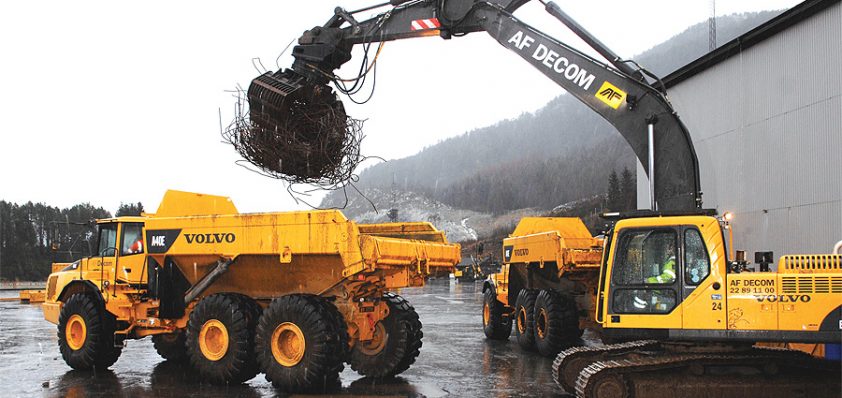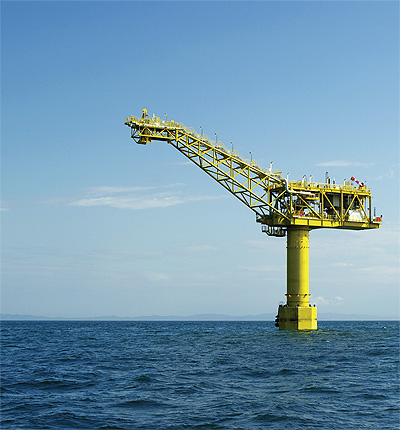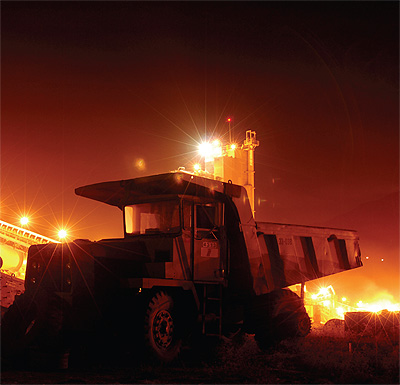
AF Group
On the recycling path
The AF Group is one of Norway’s largest construction companies, boasting a turnover of 5.5 billion NOK in 2007 (preliminary results).
Employing over 2000 people across its sites in Norway, Sweden and Poland, the Group is active in a number of construction-based industries. The company is organised into five key business areas: building services, property development, civil construction services, environmental activities, and energy optimisation.
Primarily emerging as a construction company 20 years ago, the Group has built up a large amount of experience and competence within the industry, and is a turnkey supplier of services across  Norway. Working with both state-owned and industrial ventures, AF has developed core competencies within the oil and gas, power, transportation and harbour market sectors. The AF Group is also active in the property market – managing its portfolio by acquiring, developing and selling a number of residential and commercial buildings. Within this sector, the company works on both private and public structures, and has completed a number of important rehabilitation projects in Oslo and the wider Østlund area, as well as in Gothenburg and Southern Sweden.
Norway. Working with both state-owned and industrial ventures, AF has developed core competencies within the oil and gas, power, transportation and harbour market sectors. The AF Group is also active in the property market – managing its portfolio by acquiring, developing and selling a number of residential and commercial buildings. Within this sector, the company works on both private and public structures, and has completed a number of important rehabilitation projects in Oslo and the wider Østlund area, as well as in Gothenburg and Southern Sweden.
“The energy and environmental sectors have emerged over the last three years out of the construction side of the business, and this has emphasised the concerns of the Group, and what we are capable of. The global need to focus on energy and environmental issues has also stimulated this development within the organisation,” states AF Group executive vice president Robert Haugen. The organisation’s activity in the environmental sector includes the demolition and clean-up of both onshore and offshore installations. AF Decom acts as the Group’s leading deconstructionist of buildings and installations, and the division dismantles and recycles oil installations at its Vats facility, in the municipality of Vindafjord.
Robert elaborates on the Group’s activity within the offshore sector: “AF Decom has acted as our demolition and environmental clean-up division since 2002, and has become one of the leading companies in the market. To highlight our activity within the offshore industry, we have split AF Decom into two business units – one that focuses on onshore, and another on offshore activities. Decom offshore concentrates on projects in the North Sea, especially in the Norwegian and UK sectors, and we have set up a recycling facility in Vats to meet with demand in this area. At the site, we take offshore installations, deconstruct them, and then recycle the remnants.
“The Group is undertaking a period of significant investment at Vats, to make it the most modern and technologically advanced facility operating in the North Sea area,” Robert continues.” We are developing Vats’ quays, increasing them beyond their current 200 metres in length, so we can deal with projects involving every kind of vessel that is being used in the North Sea at this time, including heavy lifting vessels. The Vats plant will hopefully be completed by June 2009, fully equipped to meet the quality and standards demanded by the industry, including double-barrier floors and modern spillwater collection points to gather hazardous materials.”
Prior to AF Decom taking over at Vats in 2004, the facility rose to general recognition throughout the offshore industry via its decommissioning of the Brent Spar loading buoy. Today, the division applies the ‘small piece’ methodology in its dismantling of platforms. This technique, developed alongside Total Fina Elf and ConocoPhillips, uses excavation machines and robots with mounted tools to steadily deconstruct installations, before transporting them to the Vats facility. The site was used in the 1970s and 1980s as part of the maintenance programme for installations located at Statfjord, Gullfaks, and Troll, and is designed to remove hazardous materials, electrical products, and non-metals as the first stage of the dismantling process. In fact, around 98 per cent of installations removed from the North Sea can be recycled, which emphasises the lucrative industry the AF Group is developing into.
Within the energy business area, the Group is capable of providing a number of energy rationalisation services, and has expanded into the heating, ventilation, air conditioning and cooling (HVAC) market. Robert describes the company’s activities: “The development of AF Decom’s onshore and offshore capabilities has really highlighted the work that needs to be done in this market area, and the potential that we can achieve. Within the energy sector, the Group has just purchased 51 per cent of Mollier AS, a company that specialises in HVAC projects, with a presence in Stavanger and Bergen. This is a new market area for us, and increases our activity in the North Sea.” Oil and gas companies, as well as turnkey contractors in the maintenance and modification sectors, normally request HVAC services, so this market will act as a supplement to the organisation’s offshore recycling activities. The Group employs a team of 72 highly trained engineers, technicians, and electricians, and is capable of providing engineering, procurement, construction, installation and commissioning services.
The company has been dealing with many deconstruction and HVAC projects in the North Sea over the last 12 months, as Robert is keen to point out: “We have recently received a request to pick up a loading buoy located at Kittiwake in the North Sea, and to disconnect it from its fixed installation point. This buoy will be taken to the Vats site, and dismantled. We are trying to offer clients a complete package within the offshore recycling market, and provide a full range of services. Our goal is for AF Decom to become a major player in the offshore deconstruction market in the future, so we are looking to establish our relationships with oil and gas operators to ensure this position in the North Sea. I think the AF Group’s experience within the construction and recycling division has shown us what processes need the most focus, which means all of our deconstruction projects are handled and prioritised accordingly.
“The ethos that underpins the AF Group’s activities is that we do not try to make a project more complicated than it needs to be, while at the same time maintaining a complete focus on HSE standards,” Robert explains. “The quality of our service is also an important factor in separating the Group from its competitors in the North Sea – it’s consistently integrated into our business at every level. Deconstruction projects provide totally different challenges to those we have experienced in the new building sector, for instance, so we must always be ready to respond to unique circumstances. Our work in the Kittiwake oilfield has meant we have completed projects for Venture, as well as ConocoPhillips and Shell. To undertake this line of deconstruction means we must also work with Heerema Marine Constructions in coming up with viable solutions.”
every level. Deconstruction projects provide totally different challenges to those we have experienced in the new building sector, for instance, so we must always be ready to respond to unique circumstances. Our work in the Kittiwake oilfield has meant we have completed projects for Venture, as well as ConocoPhillips and Shell. To undertake this line of deconstruction means we must also work with Heerema Marine Constructions in coming up with viable solutions.”
The AF Group’s operations in the offshore recycling market are very much in the early stages, but there are many platforms in the North Sea that are shut down, and should eventually go through the deconstruction process. It is estimated that around 420 offshore structures will need to be removed and recycled in the next 20 years, so the company has many projects that will arise in the future. One of the most notable deconstruction projects that the AF Group has completed recently is the demolition of the Ekofisk 2/4 Tank Topsides in 2007. Applying the ‘small piece’ method, the platform was cut up using shears and sorting equipment, before being loaded onto specially built containers and transported to Vats. At the site, the waste fractions were processed, recycled, and delivered to approved recipients.
An ongoing project that is due to be completed in 2009 is AF Decom Offshore’s deconstruction of Ekofisk CAT 1, as commissioned with a letter of intent by Heerema in 2005. Heerema used semisubmersible crane vessels to hoist parts of the CAT 1 structure onto barges, which were then delivered to Vats. The structures were driven ashore via multi-wheel trailers to allow Decom’s engineers to complete the dismantling process, using excavation machines with specially mounted tools. The success of the project so far has meant that 98 per cent of the materials on the installation can be recycled.
While projects such as these are continually emerging, Robert is keen to outline the reality facing the AF Group’s offshore activity over the coming years: “The main challenge facing the division is the establishment of a steady turnover, which can only occur through a consistent level of agreed projects. As contracts develop, we can create and solidify our working team to the extent that we work more efficiently and effectively. We have managed to bring in the key personnel within the industry to establish a foothold in the sector, and we have maintained good levels of progression on this front. As more projects emerge in the North Sea, our team of employees must be ready for the challenge of new and exciting deconstruction tasks.
“Finding the right personnel has been a challenge to AF Decom in the past, but the scale of the Group means we have skills in getting the right people on our team,” Robert comments. “Our focus covers the whole of Norway, and we have also established a new onshore deconstruction company in Gothenburg, Sweden, as well as looking for potential areas of expansion in Poland. One of the reasons we are planning to grow into this area is the availability of skilled labour, and thechance to increase our engineering capacity. At this time, we have employed seven Polish engineers to assist in our offshore deconstruction projects.”
Robert concludes by reiterating the company’s aims for the future within the offshore industry: “I would like to see the AF Group become a major offshore entrepreneur, and strengthen its position within the market. We are also expanding our influence in Norway’s onshore oil and gas sites, and we are focusing on developing the skills of a team of people to service this sector as well.”
AF Group
Services Offshore installation dismantling and recycling